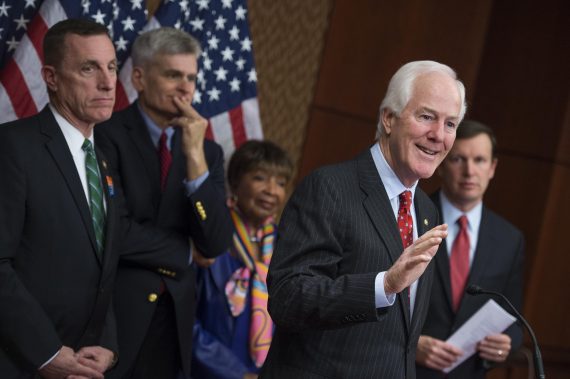
Senate Majority Whip John Cornyn, R-Texas, speaks in favor of mental health reform legislation on Monday. Also appearing are, from left, Rep. Tim Murphy, R-Pa., Sen. Bill Cassidy, R-La., Rep. Eddie Bernice Johnson, D-Texas, and Sen. Chris Murphy, D-Conn.
(12-13-16) Shortly before 3 p.m. today, President Barack Obama will sign the 21st Century Cures Act, which includes two important mental health bills, including the Helping Families in Mental Health Crisis Act that Rep. Tim Murphy (R-Pa.) tenaciously pushed for nearly four years.
Two years ago, I began a year-end tradition of naming individuals or groups who I believe had the most impact in mental health during the year. Rep. Murphy was my primary pick in 2014 even though Democrats successfully blocked his initial efforts to get his bill passed. As I’ve written before, he was relentless and should be proud and much credited today at the White House signing.
But he didn’t get his bill to the president’s desk today alone and I am selecting three other key players this year as my choices for the most impactful mental health warriors of 2016. They are Senators John Cornyn, (R.-Tx.) Chris Murphy (D-Conn.) and Bill Cassidy (R.-La.).
It was Chris Murphy and Dr. Bill Cassidy who initially introduced a companion bill to Tim Murphy’s in the Senate. They held a Senate Mental Health Summit to educate their colleagues and worked on compromise language that won their bill widespread support. Bipartisan support is not enough, however, in Congress to get a bill moving through the political system. Because both Murphy, who was elected in 2013, and Cassidy, who moved from the House to the Senate in the 2014 elections, lacked seniority, it would have been difficult for them to get their legislation out of committee. Undaunted, they were able to persuade Sen. Lamar Alexander (R. Tenn.), the powerful chair of the Senate Health, Education, Labor and Pensions Committee (HELP), to back them.
Even with Alexander’s help, the Murphy/Cassidy bill would have had difficulty if Sen. Cornyn, the Senate Majority Whip, had not made mental health reform one of his chief priorities. He had simultaneously introduced his own mental health bill, the Mental Health Safe Communities Act, in the Senate Judiciary Committee.
Cornyn’s bill hit a bump because of his efforts to restore gun ownership rights to veterans who had been ruled incapable of managing their own affairs by the Veterans Administration without a hearing. But once he agreed to redraft language that Democrats, including the Senate Minority Leader Chuck Schumer (D-N.Y.), had objected too, Cornyn’s bill picked up steam and additional support from Sen. Chuck Grassley, (R-IA) the chair of the Judiciary Committee.
By this point, Rep. Fred Upton (R.-Mich.), the chair of the House Energy and Commerce Committee, had reworked the most controversial parts of Rep. Murphy’s bill in the House so that he could move the Helping Families in Mental Health Crisis Act, out of committee and quickly through that chamber.
Which brings me to why Senators Cornyn, Murphy and Cassidy deserve public credit. Passing Rep. Tim Murphy’s bill in the House had set the stage, but if the three Senators had not worked behind the scenes with their colleagues to get both the senate version of the Helping Families In Mental Health Crisis Act (known as the Senate Mental Health Reform Act) and Cornyn’s bill merged into the 21st Century Cures Act during the lame duck session, no reform bill would have been passed.
Blending the two Senate bills and Rep. Murphy’s House bill into the 21st Century Cures Act virtually guaranteed their approval and signing by Preside Obama. Why? Because the 21st Century Cures Act contains several pet projects favored by the White House. Three of them were mentioned by President Obama recently in a press release, explaining why he planned to sign the new law.
First, for the families and communities that have lost too many loved ones to the heroin and prescription opioid epidemic, it invests the $1 billion I requested in my budget to address this crisis. Second, the bill answers the Vice President’s call for a Moonshot in cancer research by investing $1.8 billion in new resources to accelerate discoveries. Third, it invests nearly $3 billion to build upon the major biomedical research initiatives we have launched in my Administration – known as the BRAIN and Precision Medicine Initiatives – which are tackling diseases like Alzheimer’s and creating new research models to find cures and better target treatments.
There’s another reason why the Cures Act was approved in the Senate by a vote of 94-5 and also passed in the House by a vote of 392-26.
The pharmaceutical industry unleashed a massive lobbying campaign that outraged Senators Elizabeth Warren (D-Mass.) and Bernie Sanders (D.VT). Warren said Big Pharma had “hijacked” the bill which speeds up the FDA approval of medications, getting them on the shelves faster by waving safeguards, critics claim.
Having already named Rep. Murphy in 2014, I believe Senators Cornyn, Murphy and Cassidy deserve credit for getting mental health reforms signed into law today making the trio the most impactful mental health warriors in 2016.



